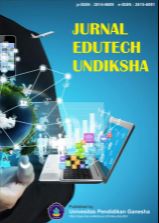PENGARUH STRATEGI KONTEKSTUAL REACT TERHADAP KINERJA PEMECAHAN MASALAH IPA SISWA KELAS VIII SEMESTER GENAP SMP NEGERI 6 SINGARAJA
DOI:
https://doi.org/10.23887/jeu.v2i1.3582Abstrak
Permasalahan dalam penelitian ini adalah rendahnya kinerja pemecahan masalah IPA siswa khususnya kelas VIII SMP Negeri 6 Singaraja. Penelitian ini bertujuan untuk mendiskripsikan perbedaan kinerja pemecahan masalah siswa antara kelompok belajar yang menggunakan strategi kontekstual REACT dan kelompok belajar yang menggunakan strategi konvensional. Jenis penelitian ini adalah eksperimen semu (quasi experiment) dengan desain penelitian Control Group Pre-test Post-test Design. Populasi penelitian ini adalah Siswa Kelas VIII Semester Genap SMP Negeri 6 Singaraja Tahun Pelajaran 2013/2014, yang terdiri dari 10 kelas dengan jumlah populasi 345 orang. Sampel penelitian ditentukan dengan teknik random sampling yang disertai dengan proses matching (dipasangkan) dan diperoleh 25 siswa anggota kelompok eksperimen dan 25 siswa anggota kelompok kontrol. Data mengenai kinerja pemecahan masalah IPA dikumpulkan dengan menggunakan tes kinerja pemecahan masalah dan selanjutnya dianalisis dengan uji-t satu ekor pada taraf signifikansi 5%. Berdasarkan hasil analisis diperoleh hasil penelitian sebagai berikut. Terdapat perbedaan kinerja pemecahan masalah siswa yang belajar menggunakan strategi kontekstual REACT dengan kinerja pemecahan masalah siswa yang belajar menggunakan strategi Konvensional (thitung =1.67 > ttabel=1.52 / Ha diterima dan H0 ditolak) pada taraf signifikansi 5%. Dengan kata lain, penerapan strategi kontekstual REACT berpengaruh positif terhadap kinerja pemecahan masalah IPA siswa.Kata Kunci : kinerja pemecahan masalah, strategi kontekstual REACT, pembelajaran IPA
The problem in this study is the low performance of students in particular science problem solving SMP Negeri 6 Singaraja. This study aims to describe students' performance problem-solving differences between the study groups that use contextual strategies and the REACT study group using conventional strategies. This research is a quasi experimental (quasi-experiment) with a research design Control Group Pre-test post-test design. The population was Class VIII Second Semester Students of SMP Negeri 6 Singaraja Academic Year 2013/2014, which consists of 10 classes with a total population of 345 people. The research sample was determined by random sampling technique coupled with the matching process (paired) and obtained 25 student members of the experimental group and a control group of 25 student members. Data on science performance problem-solving was collected using a performance test problem solving and then analyzed with a tail t-test at significance level of 5%. Based on the analysis of the results obtained the following results. There are differences in performance problem-solving of students who learn to use contextual strategies REACT with problem-solving performance of students who learn using conventional strategies (tcount=1.67> ttable=1.52 / Ha is accepted and H0 is rejected). In other words, the application of contextual REACT strategy has a positive effect on the performance of science students' problem solving.
keyword : performance problem solving, contextual REACT strategy, learning science
Diterbitkan
2014-07-23
Cara Mengutip
., I. K., ., D. I. M. T. S. M., & ., I. K. S. S. (2014). PENGARUH STRATEGI KONTEKSTUAL REACT TERHADAP KINERJA PEMECAHAN MASALAH IPA SISWA KELAS VIII SEMESTER GENAP SMP NEGERI 6 SINGARAJA . Jurnal Edutech Undiksha, 2(1). https://doi.org/10.23887/jeu.v2i1.3582
Terbitan
Bagian
Articles
Lisensi
Authors who publish with the Jurnal EDUTECH Undiksha agree to the following terms:
- Authors retain copyright and grant the journal the right of first publication with the work simultaneously licensed under a Creative Commons Attribution License (CC BY-SA 4.0) that allows others to share the work with an acknowledgment of the work's authorship and initial publication in this journal.
- Authors are able to enter into separate, additional contractual arrangements for the non-exclusive distribution of the journal's published version of the work (e.g., post it to an institutional repository or publish it in a book), with an acknowledgment of its initial publication in this journal.
- Authors are permitted and encouraged to post their work online (e.g., in institutional repositories or on their website) prior to and during the submission process, as it can lead to productive exchanges, as well as earlier and greater citation of published work. (See The Effect of Open Access)














